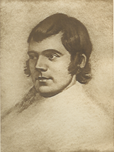The Twa Herds (or The Holy Tulzie)
by Robert Burns
Blockheads with reason wicked wits abhor,
- Pope.
But fool with fool is barbarous civil war.>
O a' ye pious godly flocks,
Weel fed on pastures orthodox,
Wha now will keep you frae the fox,
Or worrying tykes,
Or wha will tent the waifs and crocks,
About the dykes?
The twa best herds in a' the wast,
The e'er ga'e gospel horn a blast,
These five and twenty simmers past,
O! dool to tell,
Ha'e had a bitter black out-cast
Atween themsel'.
O, Moodie, man, and wordy Russell,
How could you raise so vile a bustle;
Ye 'll see how New-Light herds will whistle,
And think it fine:
The Lord's cause ne'er gat sic a twistle
Sin' I hae min'.
O, sirs! whae'er wad hae expeckit,
Your duty ye wad sae negleckit,
Ye wha were ne'er by lairds respeckit,
To wear the plaid,
But by the brutes themselves eleckit,
To be their guide.
What flock wi' Moodie's flock could rank,
Sae hale and hearty every shank?
Nae poison'd sour Arminian stank,
He let them taste.
Frae Calvin's well, aye clear, they drank, -
O, sic a feast!
The thummart, willcat, brock, and tod,
Weel kenn'd his voice thro' a' the wood,
He smelt their ilka hole and road,
Baith out and in,
And weel he lik'd to shed their bluid,
And sell their skin.
What herd like Russell tell'd his tale,
His voice was heard thro' muir and dale,
He kenn'd the Lord's sheep, ilka tail,
Owre a' the height,
And saw gin they were sick or hale,
At the first sight.
He fine a mangy sheep could scrub,
Or nobly fling the gospel club,
And New-Light herds could nicely drub,
Or pay their skin;
Could shake them owre the burning dub,
Or heave them in.
Sic twa - O! do I live to see't,
Sic famous twa should disagree't,
An' names, like "villain," "hypocrite,"
Ilk ither gi'en,
While New-Light herds, wi' laughin' spite,
Say neither's liein'!
A' ye wha tent the gospel fauld,
There's Duncan, deep, and Peebles, shaul,
But chiefly thou, apostle Auld,
We trust in thee,
That thou wilt work them, het and cauld,
Till they agree.
Consider, sirs, how we're beset;
There's scarce a new herd that we get
But comes frae 'mang that cursed set
I winna name;
I hope frae heav'n to see them yet
In fiery flame.
Dalrymple has been lang our fae,
M'Gill has wrought us meikle wae,
And that curs'd rascal ca'd M'Quhae,
And baith the Shaws,
That aft hae made us black an' blae,
Wi' vengefu' paws.
Auld Wodrow lang has hatch'd mischief,
We thought aye death wad bring relief,
But he has gotten, to our grief,
Ane to succeed him,
A chiel wha 'll soundly buff our beef;
I meikle dread him.
And mony a ane that I could tell,
Wha fain would openly rebel,
Forbye turn-coats amang oursel',
There's Smith for ane,
I doubt he's but a grey-nick quill,
And that ye 'll fin'.
O! a' ye flocks o'er a' the hills,
By mosses, meadows, moors, and fells,
Come, join your counsel and your skills
To cowe the lairds,
And get the brutes the powers themsel's
To choose their herds.
Then Orthodoxy yet may prance,
And Learning in a woody dance,
And that fell cur ca'd Common Sense,
That bites sae sair,
Be banish'd o'er the sea to France:
Let him bark there.
Then Shaw's an' Dalrymple's eloquence,
M'Gill's close nervous excellence,
M'Quhae's pathetic manly sense,
An' guid M'Math,
Wi' Smith, wha thro' the heart can glance,
May a' pack aff.
Notes to the poem:
In a MS. now in the British Museum, Burns gives an account of the origin of this piece: "The following was the first of my poetical productions that saw the light. I gave a copy of it to a particular friend of mine who was very fond of these things, and told him, "I did not know who was the author, but that I had got a copy of it by accident." The occasion was a bitter and shameless quarrel between the two rev. gentlemen, Mr. Moodie (of Riccarton) and Mr. Russell (of Kilmarnock). It was at a time when the hue and cry against Patronage was at the worst."
Source:
The Poetical Works Of Robert BurnsCopyright 1910
Ward, Lock, and Co., Ltd
